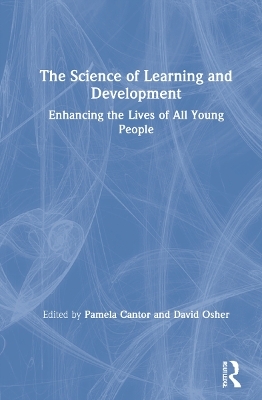
The Science of Learning and Development
Routledge (Verlag)
978-0-367-48108-7 (ISBN)
Expanding key published articles and expert commentary, the book explores a profound evolution in thinking that integrates findings from psychology with biology through sociology, education, law, and history with an emphasis on institutionalized inequities and disparate outcomes and how to address them. It points toward possible solutions through an understanding of and addressing the dynamic relations between a child and the contexts within which he or she lives, offering all researchers of human development and education a new way to understand and promote healthy development and learning for diverse, specific youth regardless of race, socioeconomic status, or history of adversity, challenge, or trauma.
The book brings together scholars and practitioners from the biological/medical sciences, the social and behavioral sciences, educational science, and fields of law and social and educational policy. It provides an invaluable and unique resource for understanding the bases and status of the new science, and presents a roadmap for progress that will frame progress for at least the next decade and perhaps beyond.
Pamela Cantor, MD, is a child and adolescent psychiatrist specializing in trauma and the founder of Turnaround for Children, an organization grounded in science that builds the capacities of educators to buffer the negative impacts of trauma and intentionally promote healthy whole-child development and learning for every student. She is a governing partner of the Science of Learning and Development Alliance, which is elevating a diverse body of scientific literature to support the transformation of the systems that educate and develop children. David Osher, PhD, is Vice President and Institute Fellow at the American Institutes for Research, where he does research and supports practice, domestically and globally. He has led research, knowledge syntheses and technical assistance, and published on school climate and the conditions for learning; social and emotional learning; supportive, community-building approaches to school discipline and safety; cultural competence and responsiveness; family support and engagement, implementation science; and the science of learning and development. His recent publications include Creating Safe, Equitable, Engaging Schools and Keeping Students Safe and Helping Them Thrive: A Collaborative Handbook on School Safety, Mental Health, and Wellness.
Foreword I: The Science of Learning and Development: Entering a New Frontier of Human Development Theory, Research, and Application Foreword II: We Should Treat Students as Whole People: Brain Science Proves It Part 1: Features and Implications of the Science of Learning and Development 1. Malleability, Plasticity, and Individuality: How Children Learn and Develop in Context 2. Drivers of Human Development: How Relationships and Context Shape Learning and Development 3. Developments in Developmental Research and Theory 4. Fostering Optimal Development and Averting Detrimental Development: Prescriptions, Proscriptions, and Specificity Part 2: Implications for Educational Practice of the Science of Learning and Development 5. Using the Science of Learning and Development to Transform Educational Practice 6. Sciences of Learning and Development: Some Thoughts from the Learning Sciences 7. Practice That Supports Learning and Development: A Commentary 8. Commentary: Relationships, Developmental Contexts, and the School Development Program Part 3: Focusing on Equity 9. Teaching for Equity: Where Developmental Needs Meet Racialized Structures 10. Looking at SoLD Through an Equity Lens: Will the Science of Learning and Development Be Used to Advance Critical Pedagogy or Will It Be Used to Maintain Inequity by Design? 11. Equitable Learning and Development: Applying Science to Foster Liberatory Education Part 4: Towards the Future of the Science of Learning and Development 12. Making Developmental Science Accessible, Usable, and A Catalyst for Innovation 13. From the Science of Learning (and Development) to Learning Engineering 14. The Future of the Science of Learning and Development: Whole-Child Development, Learning, and Thriving in an Era of Collective Adversity, Disruptive Change, and Increasing Inequality
| Erscheinungsdatum | 23.06.2021 |
|---|---|
| Zusatzinfo | 1 Tables, black and white; 2 Line drawings, black and white; 2 Illustrations, black and white |
| Verlagsort | London |
| Sprache | englisch |
| Maße | 156 x 234 mm |
| Gewicht | 539 g |
| Themenwelt | Geisteswissenschaften ► Psychologie ► Allgemeine Psychologie |
| Geisteswissenschaften ► Psychologie ► Entwicklungspsychologie | |
| Geisteswissenschaften ► Psychologie ► Pädagogische Psychologie | |
| Sozialwissenschaften ► Pädagogik ► Schulpädagogik / Grundschule | |
| Sozialwissenschaften ► Pädagogik ► Schulpädagogik / Sekundarstufe I+II | |
| ISBN-10 | 0-367-48108-1 / 0367481081 |
| ISBN-13 | 978-0-367-48108-7 / 9780367481087 |
| Zustand | Neuware |
| Informationen gemäß Produktsicherheitsverordnung (GPSR) | |
| Haben Sie eine Frage zum Produkt? |
aus dem Bereich


